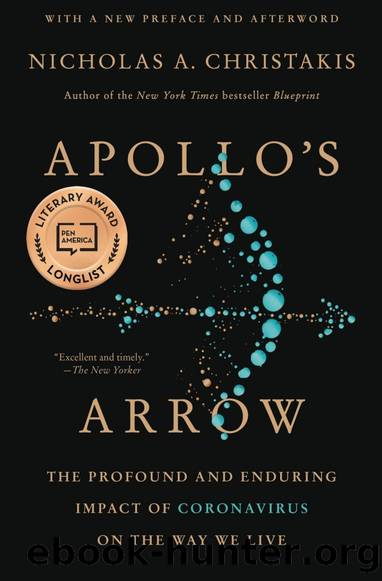Apollo's Arrow: The Profound and Enduring Impact of Coronavirus on the Way We Live by Nicholas A. Christakis

Author:Nicholas A. Christakis [Christakis, Nicholas A.]
Language: eng
Format: epub
ISBN: 9780316628211
Amazon: 0316628212
Goodreads: 53487333
Publisher: Hachette Book Group
Published: 2020-10-27T00:00:00+00:00
And so the pandemic in 2020 highlighted long-standing differences and inequality. But it also fostered some new dichotomies.
In China, a huge divide opened up between those who were from Wuhan and those who were not. Discrimination against Wuhan residents was widespread. Even if a person was not infected and had not been to Wuhan in years, simply having come from there (as Chinese identity papers invariably indicated) meant that a person could not find an apartment to rent in Beijing, a thousand miles away.74 In the United States, it would be like landlords in Iowa refusing to rent apartments to people with New York State driverâs licenses. And yet, similar regional differences did appear in other ways in our country, such as when some governors tried to stop out-of-state drivers from entering their states.
Still other distinctions were also highlighted by the virus, such as between those who could work from home and those who could not or between those who were following NPI recommendations and those who were not (with respect to wearing masks and keeping a safe distance).
And the virus created another new division: those who are immune and those who are not. Over the initial years of this pandemic, as the virus circulates in our species, progressively more people will have the illness and recover. Based on what we know about other coronaviruses, this will confer immunity of some duration. And it seems likely that even if people are re-infected with the same virus, the second episode will be mild (though it is too early to say for certain).75
At the start of the epidemic, along with other experts, I advocated for widespread antibody testing to allow us to target our efforts to control the epidemic and also to identify people who were immune and who could more safely return to work (especially health-care workers). But it occurred to me that we could have a kind of dystopian scenario where employers bid up wages for those who could prove they were immune. Indeed, first in Europe and later in the United States, people considered the idea of testing for immunity and issuing some sort of certification to this effect. Holders of such immunity passports could then return to nonessential (not just essential) jobs and could participate in large gatherings with their similarly immune brethren.76
Certification of immunity (after vaccination or recovery from disease) is not without precedent. Hospitals and schools require workers to get vaccinations and prove that they do not have tuberculosis. When my wife, Erika, and I got married in Philadelphia in 1991, we were required to take a blood test to prove that we did not have syphilis. Veterinary workers may be required to prove they have been vaccinated for rabies. Many countries, including the United States, require immigrants to prove that they have been vaccinated for various contagious pathogens (in 2020, the list in the United States included fourteen different diseases).77 And in antebellum New Orleans, people who were immune to yellow fever had a special status (they were said to be âacclimatedâ).
Download
This site does not store any files on its server. We only index and link to content provided by other sites. Please contact the content providers to delete copyright contents if any and email us, we'll remove relevant links or contents immediately.
Men In Love by Nancy Friday(5234)
Everything Happens for a Reason by Kate Bowler(4734)
The Immortal Life of Henrietta Lacks by Rebecca Skloot(4576)
Why We Sleep by Matthew Walker(4434)
The Sports Rules Book by Human Kinetics(4379)
Not a Diet Book by James Smith(3410)
The Emperor of All Maladies: A Biography of Cancer by Siddhartha Mukherjee(3148)
Sapiens and Homo Deus by Yuval Noah Harari(3065)
Day by Elie Wiesel(2780)
Angels in America by Tony Kushner(2652)
A Burst of Light by Audre Lorde(2597)
Endless Forms Most Beautiful by Sean B. Carroll(2473)
Hashimoto's Protocol by Izabella Wentz PharmD(2371)
Dirty Genes by Ben Lynch(2313)
Reservoir 13 by Jon McGregor(2300)
Wonder by R J Palacio(2203)
And the Band Played On by Randy Shilts(2197)
The Immune System Recovery Plan by Susan Blum(2057)
Stretching to Stay Young by Jessica Matthews(2036)
